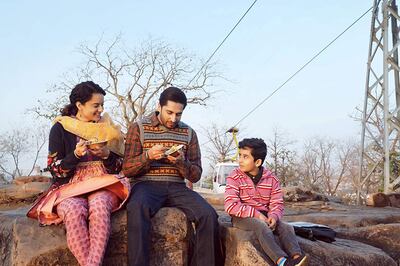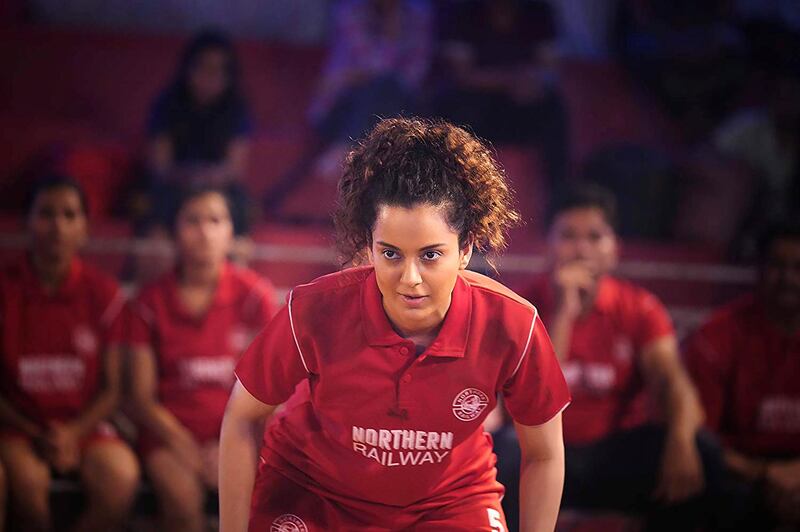Panga is a difficult film to be objective about. While it is, undoubtedly a fine example of thoughtful storytelling, it's tough to congratulate lead actress Kangana Ranaut for a film with a strong message about feminism and motherhood just days after her remarks targeting women who were against the death penalty when it comes to the 2012 Nirbhaya gang rape and murder case. A few days ago, during a press conference, Ranaut said that any woman against the capital punishment for rapists should be thrown injail with those rapists, and all but blames the mothers for the actions of their sons. Equally difficult is the task of criticising second lead Richa Chadha's uninspiring, one-note performance, given her real-life activism to raise awareness about human rights violations against the backdrop of India's current political unrest. But we must separate the art from the artists, and so here we are.
Set, for the most part, in Bhopal, India, Panga is the story of Jaya Nigam (Kangana Ranaut), the forgotten former captain of the Indian women's kabaddi team. Once hailed as the best raider the country had ever seen, Jaya now lives with her husband Prashant (Jassie Gill) and 7-year-old son Aditya (Yagya Bhasin). Her halcyon days of national fame and sporting glory long over as she punches tickets at Bhopal railway station and finds herself at the receiving end of her boss's taunting admonitions whenever the demands of motherhood come in the way of her job.
Jaya's life is a happy one, but in one telling scene, she remarks, with a tinge of sadness, "I could have done so many things, and what am I doing". It's not a grand moment, or a sentiment that is professed with fanfare or pompousness, but it is an important window into Jaya's heart. She doesn't regret trading her kabaddi shoes for the maternity smock – it was a decision she made, it wasn't forced on her by a demanding, unsupportive husband – but as a departure from the idealised, self-sacrificing trope of motherhood in Bollywood, Jaya is keenly aware of exactly how much she has given up to play wife and mother. And every once in a while, she allows it to sting.
A series of improbable events, that require some imagination on the part of the audience to buy into, results in Jaya once again trying out for the national team. Obviously, she gets in, but not before overcoming the obvious obstacles – a family that flails and flounders in the absence of her behind-the-scenes labour, snide comments about her poor fitness levels and advanced age given that at 32, she's competing with women almost a decade younger, and the suffocating mummy guilt. At one point, Jaya calls herself a cruel and selfish mother for wanting to leave her family to fend for themselves while she trains in another part of the country. The familiar tug-of-war between ambition and personal goals, and a mother's duties.
Panga, then, is more a story about motherhood than sport. While kabaddi provides an pleasant-enough backdrop for Jaya's shaky attempts at following through on the promises she made to her younger self, writers Ashwiny Iyer Tiwari and Nikhil Mehrotra never quite manage to fully utilise the canvas that the sport provides. In trying to sandwich competition thrills between the bittersweet rigours of motherhood, Panga stretches itself too thin, and loses steam more than once. Iyer Tiwari and Mehrotra are spot on in their assessment of Jaya's struggles – both internal and external – but instead of allowing them to play out naturally, they are resolved with almost unrealistic expediency and no lasting repercussions. Jaya and Prashant have a few tense moments despite his wholehearted support, but all is forgiven and forgotten the very next moment. Similarly, an unusual story arc that raises interesting questions about Jaya's entry into the national team is never allowed to fully develop.

Panga belongs, undoubtedly, to Ranaut and her commendable ability to fuse herself with the characters she essays. She dominates every frame of the film. Even so, Gill and Bhasin do a fantastic job of tempering her intensity with their delightful father-son chemistry and comic timing. Gill packs in romance, humour, and misty-eyed devotion in Prashant, while Bhasin is all kinds of adorable as the quippy, but sensitive and wise-beyond-his-years Aditya. Watching the trio huddled together as a loving, laughing young family gave me a case of warm, cinematic fuzzies. Neena Gupta, as Jaya's mother, too makes you smile every time she comes on screen.
The film's weakest link, tragically, is real-life feminist Richa Chadha as the outspoken Meenu, Jaya's former teammate, best friend, and now personal trainer. Meenu's role seems to have been written in with the sole purpose of making the point that a woman needs a man, like a fish needs a bicycle. There's nothing wrong with that point, of course, but there were better ways to make it than through buffoonery.
Panga can best be described as a collection of small moments – many resonate, some fall flat. And even though Panga doesn't hit all the right notes, it does a successful job of merging Bollywood's two dearly loved themes: motherhood and sport. Thankfully, at a crisp 129 minutes of runtime, even at its lowest moments, Panga doesn't give you opportunity to be bored or fidgety. A recommended watch.
Panga is in UAE theatres now











